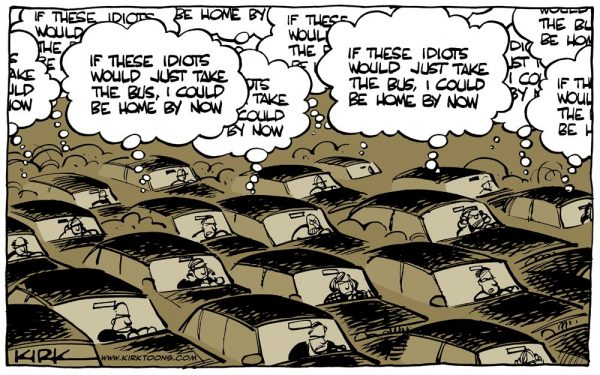STRATEGIC NARRATIVE INSIGHTS
How It All Started: Why It Matters
Traffic is a pain in Seattle. Yesterday reminded me of it.
I am lucky enough not to have to drive much anywhere for work. But that’s not the case for my wife. She is a teacher in a school district 15 miles (24 km) from our house. She commutes every day with our two boys who go to two other schools there too.
But yesterday, she couldn’t make it to work, so I replaced her to bring the kids to school, not to teach, at least not this time. I made a round trip in the morning and one in the afternoon to bring the kids back home. Traffic was horrible this Friday. It was so bad that I spent almost four hours in my car going through a dense urban maze of congested and broken roads for both trips. That was nuts.
I think I am a pretty positive person in general, but I almost lost it and started to hate every other driver around me.
A little bit like that:

Cartoon by Kirk Anderson - kirktoons.com
Then I told myself,” You can complain about any situation or do something about it.”
So, first, I decided to breathe and relax. Then, I remembered someone who decided to do something about bad traffic in large cities: Mark Frohnmayer, the founder and CEO of Arcimoto.
Mark came to mind because he is an example of a CEO I admire for changing the narrative about his industry: transportation. And I use his origin story as an example when I work with other CEOs and Founders. Arcimoto is an electric vehicle company headquartered in Eugene, Oregon, that manufactures and sells the “Fun Utility Vehicle”, or FUV, a tandem two-seat, three-wheeled electric vehicle.

Here is a summary of Mark’s origin story:
“I'm Mark; in 2007, I went looking for something that didn't exist. Because then and now we drive crazy big multi-ton extractive rigs for all the simple trips, times everyone, we pave over half the city, gridlocked around a world on fire. I wanted a light footprint, electric vehicle, affordable, fun, and dialed for the everyday. I couldn't find it. And thus, Arcimoto and a new platform for mobility.”
That’s it, 70 words–carefully chosen words.
To build your strategic narrative, start with your origin story.
Like Mark, in 70 words, you should tell us why and how you started your company or how it got started by someone else. I like to think of your origin story as the seed of your company. It is probably the most valuable story, upon which all future stories and events hinge.
Your origin story is the engine that keeps you going and keeps you focused.
It's the essential recount of events that hold why you're doing what you're doing today.
It defines your values and purpose; because at some point, you stumbled across something that was interesting to you or even bugged you, and you had to decide on whether you were going to do something to fix that or ignore it. And that decision was driven by a set of values that are personal to you. So your origin story can help you navigate decisions on an ongoing basis.
But here is the thing: a lot of the time, we forget about our origin story. It's buried somewhere. We think we don't have time to talk about it, and it's fair to say that we have more pressing issues.
But your origin story also provides spiritual nourishment. I know it's a little bit unusual, but if you hear somebody tell you why they started their business and you go, “Wow, that's inspiring!”, that's what I mean by spiritual nourishment. And that's something you should not ignore. If you want to innovate with impact, you also need to consider that aspect.
There are many more reasons why your origin story matters. There is for sure a science and an art to framing it.
The best piece of advice I can give you in the context of this email is to start writing yours today.
I wrote mine here.
What about Seattle Traffic?
I’ll leave you with this: thinking you can still commute the old way (by car) in Seattle is a decadent narrative, one that needs to change.
And as Lady Gaga said:
“Peace. It does not mean to be in a place where there is no noise, trouble, or hard work. It means to be in the midst of those things and still be calm in your heart."
Probably a valuable state of heart to be in when you want to change the narrative.
